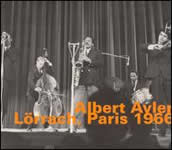|
|
 |
Dusted Reviews
Artist: Albert Ayler Album: Lörrach, Paris 1966 Label: Hat Hut Review date: Apr. 20, 2003 |

|
|
|
 |
Rise and Rejoice
“Then along came Ayler. Holy shit! Brash and bold . . . Wailing, parading Albert Ayler – Psalm-swinging, Song-singing to you. Free at last, free at last. Thank God Almighty free at last.” Nobody put it quite like the late great Hal Russell, who said this in his autobiographical disc, The Hal Russell Story. Could anyone have been prepared for the sheer shock, the raw testimonial power of Ayler’s music? Hugely influential on several generations of tenor players – Joe McPhee, David Murray, David S. Ware, and Ken Vandermark, to name some of the more obvious examples – Ayler’s music sounds as fresh, wild, and uncompromising today as it must have then (we can only imagine, though the poet Ted Joans likens its impact to hearing the word “fuck” shouted in Saint Patrick’s Cathedral). On every record, from the brutal early slabs of sound to the deeply weird final records for Impulse!, Albert (often along with his brother Donald) aimed to raise the ceiling, to transform simple folk and church music into such outlandish essays in raw sound that they could deliver the musicians into some kind of mystical union.
Over the course of his tragically brief career, Ayler tended to rework the same material, generating ever more ecstatic whirls of sound. On this concert document from the end of 1966, which catches the group in the midst of a European tour which left audiences both befuddled and ecstatic, Ayler is joined by his brother on trumpet, Michael Samson on violin, William Folwell on bass, and Beaver Harris on drums. They exult in staples like “Bells,” “Spirits Rejoice,” “Ghosts,” and “Our Prayer,” among others. The previous version of this recording (and it’s a damn good thing it’s been reissued) had the track titles incorrect. Apparently when Ayler was asked after the Paris show (the recording’s final three tracks) what the song titles were, he was so tired he didn’t remember properly. No surprise there, given the surging energy of his tenor sax – which blows apart the harmonious moments even as it coos them back. The quavering sound of his horn – at once brutally forceful and intimately attuned to subtle grains of texture or modulation – is still what is most compelling about this music. Through all the formal moves this band makes – marches, hymns, free barrage – it is ultimately the preponderance of pure oscillating sound that comes across most effectively.
Beaver Harris is electric on this recording, pushing Donald Ayler to some of his most expressive playing on record during “Prophet.” Folwell (who creates such rich, almost unearthly drones with Samson) and Harris also get solo spots (which are believed to be their only ones on record with Ayler).
I’ve always seen the music documented on this 1966 tour as something of a stylistic interval between the epochal trio recordings of 1964 and the more fully-wrought ensemble recordings of the Greenwich Village gigs in 1967. But while this disc is not quite on the level of these two towering moments in Ayler’s music, it’s still a must-hear for Ayler freaks. He and his brother truly believed that their music was a long prayer to The One, and that their music could change the world. And when you’re melting to the rapture of “Our Prayer,” it almost seems believable. You don’t have to become a devout, but do not miss this stunning music.
By Jason Bivins
|







